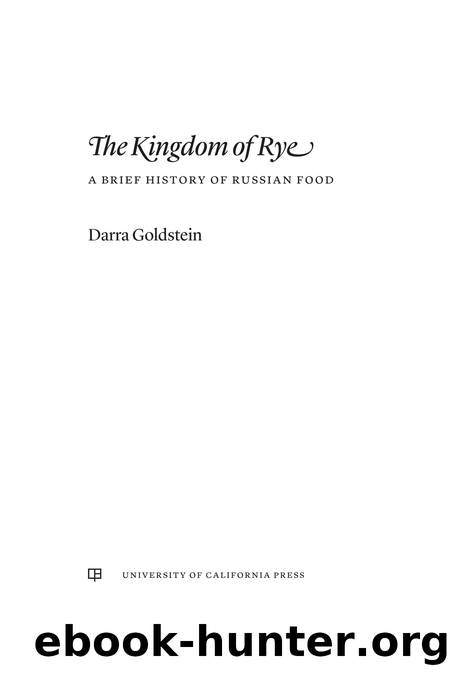The Kingdom of Rye by Goldstein Darra;

Author:Goldstein, Darra;
Language: eng
Format: epub
Publisher: University of California Press
[Veraâs] forehead was covered with sweat and her eyes bulged with excitement; she clearly was oblivious to everything in the world.â.â.â.
âPuffed .â.â. puffed .â.â. puffed rice,â she panted. âThey are selling puffed rice in the Littlestore.â She clutched my sleeve and tried to catch a breath. âAmerican puffed rice in crunchy bags? A friend of my motherâs hairdresser told us. We have to run because the line is getting bigger every second.â .â.â.
We were two hundred fifty-sixth and two hundred fifty-seventh in the line. The reason we knew was that they scribbled the numbers in blue ink right on our palms. I had to keep my marked hand apart, so the number wouldnât rub off accidentally, as happened to a woman who stood ahead of us. She kept showing her sweaty palm to everybody and asking if they could still read her number, when there wasnât anything but a faded blue stain. I was sure they would turn her away from the counter.
The legendary queues of the late Soviet period were a grueling waste of peopleâs time. And yet, at its best, the queue offered an opportunity to share knowledge and represented a kind of societal communion. Describing the siege of Leningrad, Lidiya Ginzburg wrote about how the queue broke down differences between intellectualsâwho had never bothered to think seriously about foodâand peasants, who were able to impart folk wisdom about extracting nutrients from unlikely sources, based on their historical experience of hunger. Standing in line enabled a truer collective than the stratified, secretive Soviet state.
Still, as often as not the queue provoked anxiety and bad behavior, adding to the stress of daily life. Access to food became even more difficult in the mid-1980s, during perestroika, when the state began issuing ration coupons for products like butter and sausage, often euphemistically offering an âinvitation to receiveâ a specific amount of a certain product. By the end of the 1980s, shortly before the Soviet Union collapsed, the government was rationing even basic necessities like buckwheat groats, salt, vegetable oil, and tea. Many people tried to game the system by buying things they didnât need and reselling them at a profit, or simply by selling the ration coupons for profit. The great paradox of Soviet life was that even though the stores were visibly empty, everything was available, one way or another.
Download
This site does not store any files on its server. We only index and link to content provided by other sites. Please contact the content providers to delete copyright contents if any and email us, we'll remove relevant links or contents immediately.
Machine Learning at Scale with H2O by Gregory Keys | David Whiting(3627)
Never by Ken Follett(3528)
Fairy Tale by Stephen King(2949)
The Man Who Died Twice by Richard Osman(2808)
Will by Will Smith(2580)
Friends, Lovers, and the Big Terrible Thing by Matthew Perry(1992)
The Becoming by Nora Roberts(1916)
A Short History of War by Jeremy Black(1669)
Go Tell the Bees That I Am Gone by Diana Gabaldon(1598)
515945210 by Unknown(1520)
443319537 by Unknown(1395)
A Game of Thrones (The Illustrated Edition) by George R. R. Martin(1366)
The 1619 Project by Unknown(1319)
Works by Richard Wright(1213)
Meditations (Modern Library) by Marcus Aurelius(1189)
Going There by Katie Couric(1109)
472244821 by Unknown(1101)
Living Planet by David Attenborough(1014)
264099364 by Unknown(1005)
